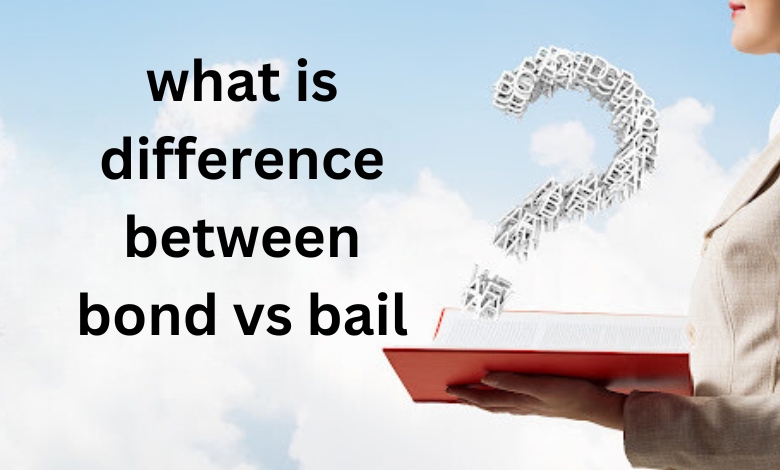Bond vs Bail both involve paying money for temporary release during a criminal case, but they differ in key ways.
Unlocking the secrets of the legal system can sometimes feel like deciphering an ancient code. With terms like bond and bail floating around, it’s easy to get tangled in a web of confusion. But fear not! We’re here to shed some light on this elusive subject and help you navigate the murky waters of “bond vs bail.”
So grab your detective hat and let’s dive into the world of legal jargon, where we unravel the mysteries behind these two crucial concepts. By understanding their similarities, differences, and weighing up their pros and cons, you’ll be equipped with all the knowledge needed to make informed decisions when faced with legal troubles.
Hints of Content
Understanding the Basics: Bond and Bail
When it comes to legal matters, terms like bond and bail often come up. But what exactly do these terms mean? Let’s start by understanding the basics.
In simple terms, both bond and bail are mechanisms used in the legal system to secure a defendant’s release from custody while awaiting trial. They serve as a guarantee that the accused will appear in court for their scheduled hearings.
Bail is typically set by a judge based on various factors such as the severity of the crime, flight risk, and criminal history. It can be paid in cash or through a bail bondsman who charges a fee for posting the bail amount on behalf of the defendant.
On the other hand, a bond is usually obtained through an insurance company or a bonding agency. A bond acts as an assurance that if the defendant fails to appear in court, the company or agency will pay off the full amount of bail to prevent forfeiture.
So why choose one over another? Factors such as financial resources, flight risk assessment, and personal circumstances play key roles in making this decision. While some may opt for paying cash bail upfront if they have sufficient funds available, others may find hiring a bondsman more feasible due to financial constraints.
Understanding these basic differences between bond and bail is crucial when navigating through legal proceedings. Whether you’re facing charges yourself or supporting someone going through this process, having clarity on these concepts empowers you with knowledge needed to make informed decisions along each step of your journey within our complex legal system.
What is Bond vs Bail?
When it comes to legal matters, terms like bond and bail often get thrown around. But what exactly do they mean, and how are they different? Let’s delve into the world of bonds vs bail and uncover their nuances.
What is Bond vs Bail?
In simple terms, both bond and bail refer to a sum of money paid as security in exchange for temporary release from custody during a criminal case. However, there are some key differences between these two concepts.
Similarities between Bonds and Bail
Let’s highlight their similarities. Both bond and bail serve as a guarantee that the defendant will appear for future court proceedings. They aim to prevent individuals from fleeing or evading justice while awaiting trial.
Differences between Bonds and Bail
Now onto the differences! Bail is typically set by a judge based on factors such as flight risk, severity of charges, previous criminal history, community ties, etc. It can be paid in cash or through property collateral. On the other hand, a bond involves hiring a professional bondsman who pays the full amount required by the court in exchange for a fee (usually 10% of the total).
Factors to Consider when Choosing between Bond and Bail
When deciding whether to opt for bond or bail, several factors come into play. Financial capability plays an important role since paying cash upfront may not always be feasible for everyone. Additionally, understanding local laws regarding bonding agents is crucial.
Pros and Cons of Bond vs Bail
Each option has its pros and cons worth considering. While posting bail allows defendants more control over their finances without relying on external parties like bondsman agencies; utilising bond services provides access to expert advice throughout one’s legal journey.
Similarities between Bonds and Bail
When it comes to the legal system, there are certain terms that often get thrown around interchangeably, leading to confusion among many people. Two such terms are bond and bail. While they may have slight differences in their application, bonds and bail share some similarities.
Both bond and bail serve as a way for someone accused of a crime to secure their release from custody while awaiting trial. In both cases, a certain amount of money is involved as collateral. This money acts as an assurance that the defendant will show up for all court appearances and comply with any conditions set by the court.
Another similarity between bonds and bail is that they can be obtained through a professional bonding company or through personal assets. A bonding company typically charges a non-refundable fee for their services, while using personal assets means putting up property or cash directly with the court.
Differences between Bonds and Bail
When it comes to the legal system, understanding the differences between bonds and bail is crucial. While both terms relate to securing a defendant’s release from custody, there are some key distinctions.
Let’s define the two terms. Bail refers to the temporary release of a suspect or defendant pending trial, usually granted upon payment of a specified amount of money or collateral. On the other hand, a bond is essentially an agreement that ensures someone’s appearance in court. It involves paying a fee (usually 10% of the total bail amount) to a licensed bail bondsman who will act as surety for your release.
One significant difference between bonds and bail lies in their financial implications. With bail, you’re required to pay the full amount upfront if you can afford it; otherwise, you may need assistance from family or friends to cover this substantial expense. However, with bonds, you only need to pay a percentage directly to the bondsman.
Another distinction relates to accountability: when posting cash bail yourself, there’s no intermediary involved – meaning you’ll be responsible for attending all court hearings personally. In contrast, when opting for bond services through a trusted agent like a professional bonding company or an experienced attorney specialising in criminal law matters – they assume responsibility for ensuring your appearance at every scheduled court date.
Factors to Consider when Choosing between Bond and Bail
When it comes to choosing between a bond and bail, there are several factors that you need to consider. Understanding these factors will help you make an informed decision based on your specific circumstances.
One important factor is the financial aspect. Bonds typically require a payment upfront, which can be a significant amount of money depending on the charges involved. On the other hand, bail allows for temporary release from custody without having to pay the full amount upfront. This can be more affordable in certain situations.
Another factor to consider is the risk involved. With a bond, if the defendant fails to appear in court or violates any conditions set by the court, they may lose their entire bond amount. Bail, however, usually involves setting certain conditions such as attending all court hearings and avoiding contact with potential witnesses or victims.
The nature of the charges against you should also be taken into account when deciding between bond and bail. Some charges may have specific requirements or restrictions regarding eligibility for bonds or bail.
Pros and Cons of Bond vs Bail
When it comes to legal matters, understanding the pros and cons of different options is crucial. This holds true when deciding between bond and bail. Let’s delve into the advantages and disadvantages of each.
One advantage of choosing a bond over bail is that it allows individuals who cannot afford to pay their full bail amount upfront to secure their release from custody. Bonds are typically obtained through a bondsman or bonding agency, who charges a percentage (usually 10%) of the total bail amount as a fee.
On the other hand, one drawback of opting for a bond is that if an individual fails to appear in court or violates any conditions set forth by the court, they may be subject to additional penalties or even face re-arrest. Furthermore, hiring a bondsman can sometimes be expensive due to their fees.
In contrast, posting bail directly with the court offers some advantages. If you have enough funds available, paying your full bail amount allows you to avoid any fees charged by a bondsman or bonding agency. It also eliminates the risk associated with using collateral for securing a bond.
However, there are downsides to posting bail as well. For those lacking sufficient resources, coming up with the entire sum can be challenging or impossible. Additionally, if you fail to show up in court after posting bail directly with the court, you may forfeit your entire payment and could potentially face arrest.
Alternatives to Traditional Bonds and Bail
In certain cases, individuals may find themselves in need of alternatives to traditional bonds and bail. These alternative options can vary depending on the jurisdiction and the specific circumstances of the case. Here are a few examples:
1. Personal Recognizance:
Also known as “PR” or “OR,” personal recognizance allows a defendant to be released without having to pay any money upfront. Instead, they sign a written agreement promising to show up for all court proceedings.
2. Release on Own Recognizance (ROR):
Similar to personal recognizance, release on own recognizance is granted based on the defendant’s promise to appear in court without needing financial collateral.
3. Supervised Pretrial Release:
In some cases, defendants may be required to report regularly to a pretrial services agency or officer while awaiting trial.
4. Cash Deposit:
Rather than using a bail bond agent, defendants can deposit cash directly with the court as collateral until their case is resolved.
5. Property Bond:
This option involves using real estate or other valuable property as collateral instead of cash or hiring a bail bond agent.
6. Citation Release:
For minor offences, law enforcement officers may issue citations rather than making an arrest, allowing individuals to avoid jail time altogether.
It’s important for defendants and their legal counsel alike to explore these alternatives when seeking release from custody before trial. Each option has its own set of requirements and potential advantages depending on individual circumstances.
Conclusion
Understanding the difference between bond and bail is crucial when dealing with legal matters. Both serve as forms of collateral to ensure that the defendant appears in court for their scheduled hearings. However, there are notable distinctions that can impact your decision-making process.
Bail refers to the temporary release of a defendant after they have paid a specified amount of money determined by the court. On the other hand, bonds involve seeking assistance from a bonding company or posting personal assets as collateral instead of paying cash directly to the court.



